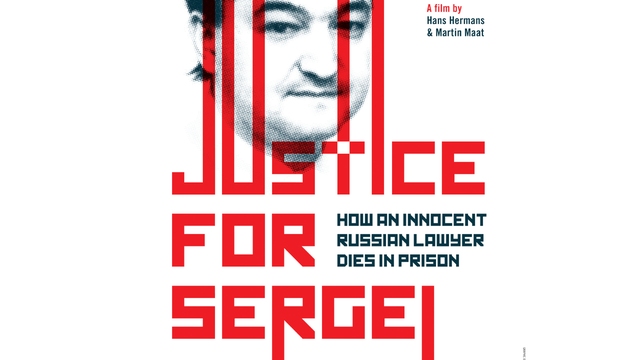Justice for Sergei is the shocking story of Sergei Magnitsky, a Russian lawyer who died in November 2009 at the age of 37 under excruciating circumstances in a Moscow detention center, still awaiting trial. His death fuelled international outrage, but inside Russia the corrupt government officials responsible were never brought to justice. One year after his death, Justice for Sergei tells the story of an ordinary man who paid the ultimate price while trying to expose the extraordinary corruption gripping Russia today.
"Conditions were terrible. In one of the cells the toilet broke and flooded the room with sewage. A mentally ill person would sleep with the prisoners some nights." These were the conditions in which Sergei lived out his last days in Butyrka Prison in Moscow. After making 450 official complaints about his treatment, and suffering the constant stabbing pains of Pancreatitis, his investigator 'Silchenko' tightens the screws - issuing a file stating that Sergei had already been medically treated.
"There is a clear feeling he had been put in such conditions, which could bring him to death", says the independent watchdog who investigated Sergei's case.
"This is my country and I don't want such things to happen here. Such lawlessness- I will fight it." Sergei's story begins with twenty plain-clothes government officials storming the offices of three Hermitage Fund companies and seizing hundreds of official documents. Investigating the incident, company lawyer Sergei discovered the largest tax fraud in Russian history; $230 million of tax refund - the exact amount the Hermitage Fund companies had paid in taxes the year before - had turned up in the bank accounts of the government officials. When the officials started threatening the company's lawyers with criminal action, head of Hermitage, Bill Browder said:
"'This isn't worth it. Get out of harm's way'".
Yet Sergei would not be silenced. He testified against the officials, and was immediately thrown into pre-trial detention, without bail, trial, or phone contact with his family. According to the wife of one of Sergei's cell mates, prisoners were told to inflict
"humiliation and beatings" upon Sergei to try to get him to withdraw his confession. And though we hear a confident and well-prepared Sergei in the recordings of his first hearing, his arguments were ignored.
"You wanted to scream at the prosecutor who laughed and told jokes whilst [Sergei] spoke", cries Sergei's aunt.
"The pain was so intense I couldn't lie down" Sergei writes in August 2009,
"the guard promised to call a doctor, but no doctor arrived". As Sergei's health deteriorated rapidly, his investigator Silchenko offered him a deal: 'testify against Hermitage and go free'. At his second trial, his mother and aunt noticed an extreme physical change in Sergei
"he looked exhausted, but he still smiled". It took only fifteen minutes for Judge Stashina to extend his detention. His heartbroken family left him chained to a radiator in a hallway. Four days later he died.
"The death of Sergei showed that there was something severely wrong in Russia", says his friend Vladimir,
"we must acknowledge this, and do something to change it".
After global outrage at the death of Sergei Magnitsky, Russian President Medvedev ordered an investigation. One year later not a single person has been indicted or charged. All of the Russian officials involved denied an interview.
LEARN MORE.
WATCH MORE.
JOIN THE DISCUSSION.

First Prize, Docudays Human Rights Festival, 2011
 Justice for Sergei is the shocking story of Sergei Magnitsky, a Russian lawyer who died in November 2009 at the age of 37 under excruciating circumstances in a Moscow detention center, still awaiting trial. His death fuelled international outrage, but inside Russia the corrupt government officials responsible were never brought to justice. One year after his death, Justice for Sergei tells the story of an ordinary man who paid the ultimate price while trying to expose the extraordinary corruption gripping Russia today.
Justice for Sergei is the shocking story of Sergei Magnitsky, a Russian lawyer who died in November 2009 at the age of 37 under excruciating circumstances in a Moscow detention center, still awaiting trial. His death fuelled international outrage, but inside Russia the corrupt government officials responsible were never brought to justice. One year after his death, Justice for Sergei tells the story of an ordinary man who paid the ultimate price while trying to expose the extraordinary corruption gripping Russia today.
 First Prize, Docudays Human Rights Festival, 2011
First Prize, Docudays Human Rights Festival, 2011





